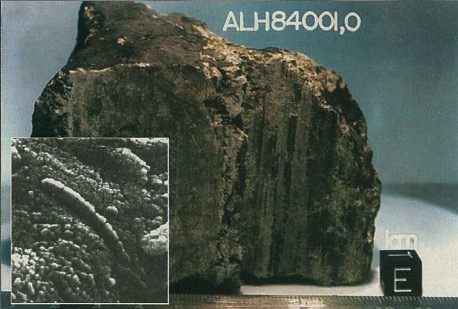“Worm” found in meteorite in Antarctica sets Earth’s theologists pondering the implications
It wasn’t quite what we had all been taught to expect, but indeed, it appears the Martians have landed—not in spaceships swooping menacingly overhead, à la this summer’s hit alien-invasion thriller “Independence Day,” but inside a 4.5-pound meteorite. Scientists speculate that an asteroid collided with Mars about 15 million years ago, launching the potato-sized rock into orbit. Thirteen thousand years ago it came to rest on our planet, to be found in 1984 in Antarctica. It is one of 12 meteorites discovered which, when heated, give off a pattern of gases known to be unique to Mars.
NASA’s evidence for life found in this 4-billion-year-old rock is three-fold: unique organic molecules usually associated with life; tiny mineral grains which look like the excretions of Earth-bound bacteria; and microfossils similar to the smallest of our bacteria. Any one taken alone might not mean much; together they are a compelling case for life. The announcement was met with worldwide excitement, one scientist calling it “the biggest thing that ever happened.”
Hindus have no theological problem with finding life elsewhere. Swami Chidananda Saraswati (Muniji) said, “We believe there is life in the whole universe.” Dr. B.V. Raman, India’s foremost astrologer, points out that “invariably Bhumidevi (Goddess Earth) figures in the different stories of the origin of Mars, either as giving birth to Mars or nourishing him. As Earth sustains life, so can Mars, only it may be not in forms visible or known to us.” Astrologer Chak-rapani Ullal regarded the discovery as “no surprise. This whole cosmos is a kind of life energy.” Mathematician Subhash Kak remarked, “Hindus accept that life exists in countless solar systems in the universe and are not surprised by life on Mars. Hindus also believe in evolution as a natural principle of nature, but not in the same way as Darwinian evolution.” Some even read in the Vedas references to space ships and intergalactic travel in ancient times. As to religion, Hindus would expect the same “eternal truth” to be present everywhere in the cosmos.
Theologians of most other faiths also profess no problem with the discoveries. Buddhists, Muslims and Jews feel God could just as well create life on Mars as anywhere else. Christians are not quite as comfortable with the possibility. Indeed, 400 years ago the Catholic pope ordered Giordano Bru-no burned at the stake for believing in a multiplicity of worlds like our own. Modern Christians focus on the issue of redemption. John Polkinghorne, an Anglican clergyman, wittily put it: “The theological question is that if Christ died for humankind, what about little green men?” Most conclude that God would have done something to ensure salvation, even for little green men.
The discovery has made many pause to consider humanity’s place in the grand scheme of the still mysterious universe.


